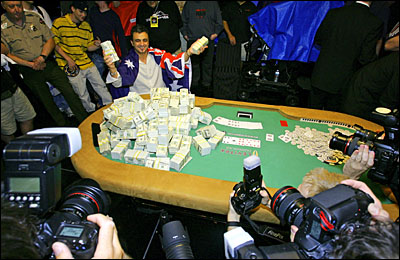 |
 | |||||
|
One Click Away
Hit TV shows like ESPN's World Series of Poker have become a ratings phenomenon. The World Series has been around since the 1970s. But the game of poker has been part of American culture for nearly two centuries. Mississippi riverboat gamblers helped popularize the game in the early 1800s. Warren Harding, the 29th U.S. president, played poker at least twice a week, and once gambled away an entire set of White House china. A lot of Americans have grown up playing an occasional social game with buddies. But when ESPN started broadcasting the World Series a few years ago, it transformed poker's image, turning it into a fashionable sport, offering players the chance to become millionaire celebrities overnight. "We've had poker on our air since 1994," says Keri Potts, a spokesperson for ESPN. "We decided in 2003 that our ratings through the years had been strong enough and encouraging enough, and our guys felt that this was about to go big, that we decided to take it 'in house' under the ESPN original entertainment banner. What does that mean? It means we treat it exactly the same as we treat all our live sporting events which is a multitude of cameras, high level technology, just the support that you'd give any other show you want to produce with the ESPN hallmark." The hip, slick presentation appeals particularly to young, male and action-fixated teens and college kids. Combine this cool image with another new and powerful force, the Internet, and you get an unprecedented boom-time for the gambling industry. Americans spent an estimated $6 billion on Internet gambling last year. The most popular site with players is Party Poker, a company that was set up in 2001 by a quartet of two Indian computer engineers, an American former porn entrepreneur and her husband. Four years later, the company floated on the London Stock Exchange at a value of more than $9 billion. Most of the profits that online poker is delivering to Party Poker come from America, says Richard Segal, Chief Executive of Party Gaming, owners of Party Poker, which is based offshore on the British territory of Gibraltar. "We have, on a daily basis, about $185 million being wagered across our system," says Segal. "If you look at how much of our business comes out of the United States, it is about 80 percent in terms of turnover." In the past few years, more than 300 Internet poker Web sites have sprung up around the world. Though most of the gamblers are American, all the Web sites are based offshore, as Internet gambling is officially illegal in the United States. It's estimated that these sites receive bets totalling more than $1 million every minute. And an increasing number of these bets are now coming from college kids. Back to Logging On and Losing Out | |||||
